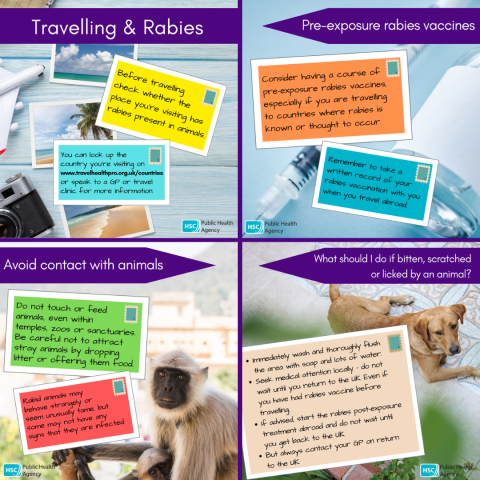Rabies remains a risk to Northern Ireland travellers

Despite rabies not being present in Northern Ireland it still remains a risk to those traveling abroad, the Public Health Agency (PHA) is therefore taking this opportunity to remind travellers about the risk of catching rabies from animals.
Rabies is an acute viral infection and it is essential to get treatment if you have been bitten, as rabies is almost certainly fatal. The infection causes swelling of the brain and symptoms usually start 2–8 weeks after being bitten or scratched.
Dr Philip Veal, Public Health Consultant at PHA, said: “Whether your traveling for pleasure or for work or maybe you’re a student on a gap year, rabies poses a very real threat in countries where it is present in animals. Rabies is spread through animal saliva, usually a bite, but it can also be spread through a scratch or by an animal licking a cut or wound, or saliva getting into the eyes, mouth or nose. It cannot be transmitted through intact skin. It is commonly spread by dogs, but can be spread by other mammals, including cats and monkeys.”
People may be used to thinking about rabies when they go to more exotic locations like Asia and Africa, but it can also be present closer to home, such as in some eastern European countries. It’s a good idea to check whether you are visiting a place where rabies is present in animals. You can look up the country you’re visiting on www.travelhealthpro.org.uk/countries or speak to a travel clinic for more information.
Dr Veal continued: “Avoid contact with any wild animals, domestic animals or pets. Do not touch or feed animals, even within temples, zoos or sanctuaries. Be careful not to attract stray animals by dropping litter or offering them food. Rabid animals may behave strangely or seem unusually tame, but some may not have any signs that they are infected. So it is always best to play it safe and avoid animals, especially strays.”
If you are traveling to a country where rabies is known or thought to occur consider having a course of pre-exposure rabies vaccines, especially if you are:
- undertaking activities that might put you at greater risk of contact with animals (e.g. cycling, running);
- visiting remote areas, where medical care and rabies post-exposure treatment may not be available;
- working with animals.
The rabies vaccine is very effective – almost 100%. Booster doses may be required after one year and then every 2–5 years for people who continue to be at risk.
If you are bitten by an animal while abroad wash and thoroughly flush the area with soap and lots of water and seek medical attention immediately, even if you have been previously immunised, as treatment may be given to reduce risk of developing the disease, do not wait until you return home.
For more information on rabies see: www.nidirect.gov.uk/conditions/rabies
